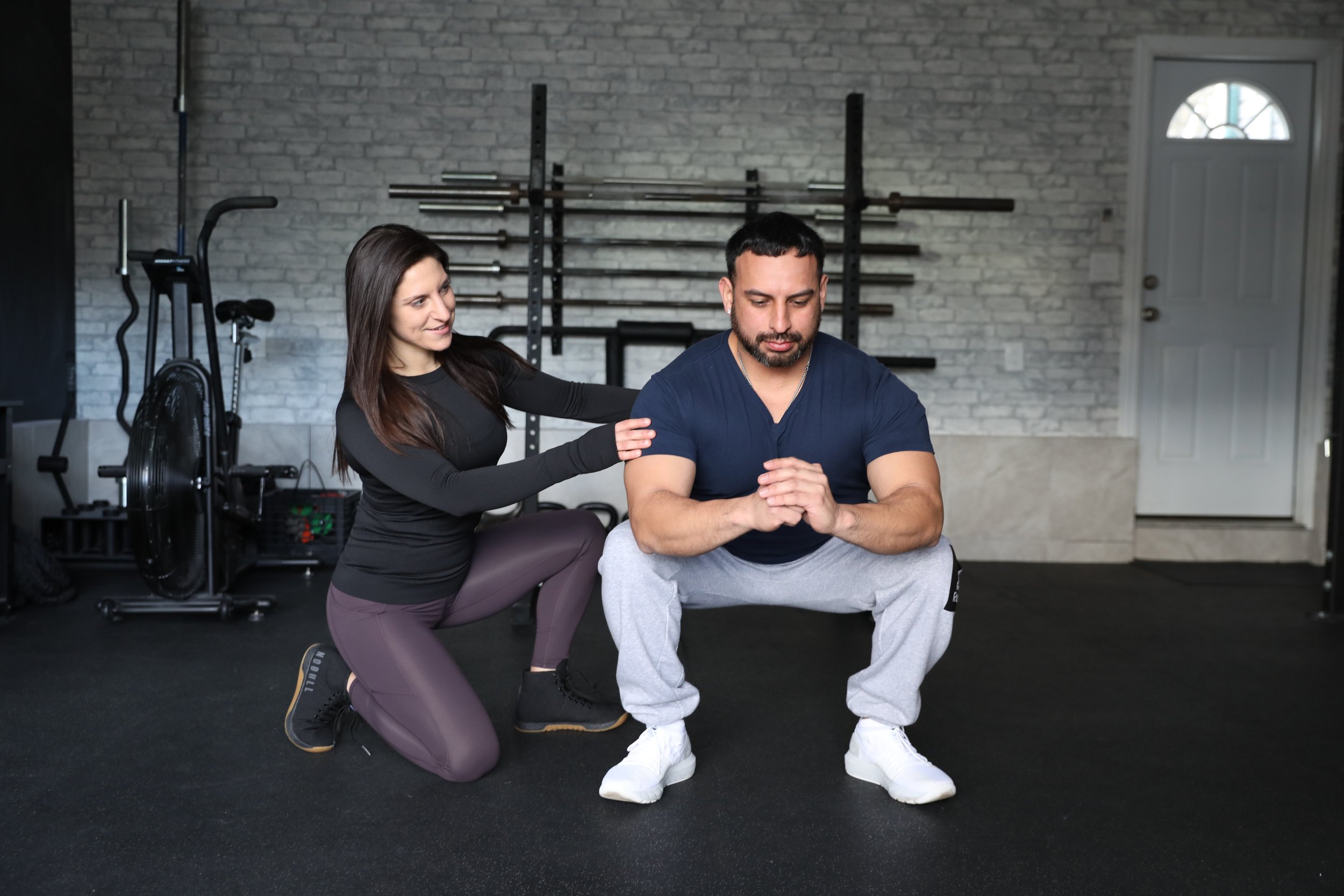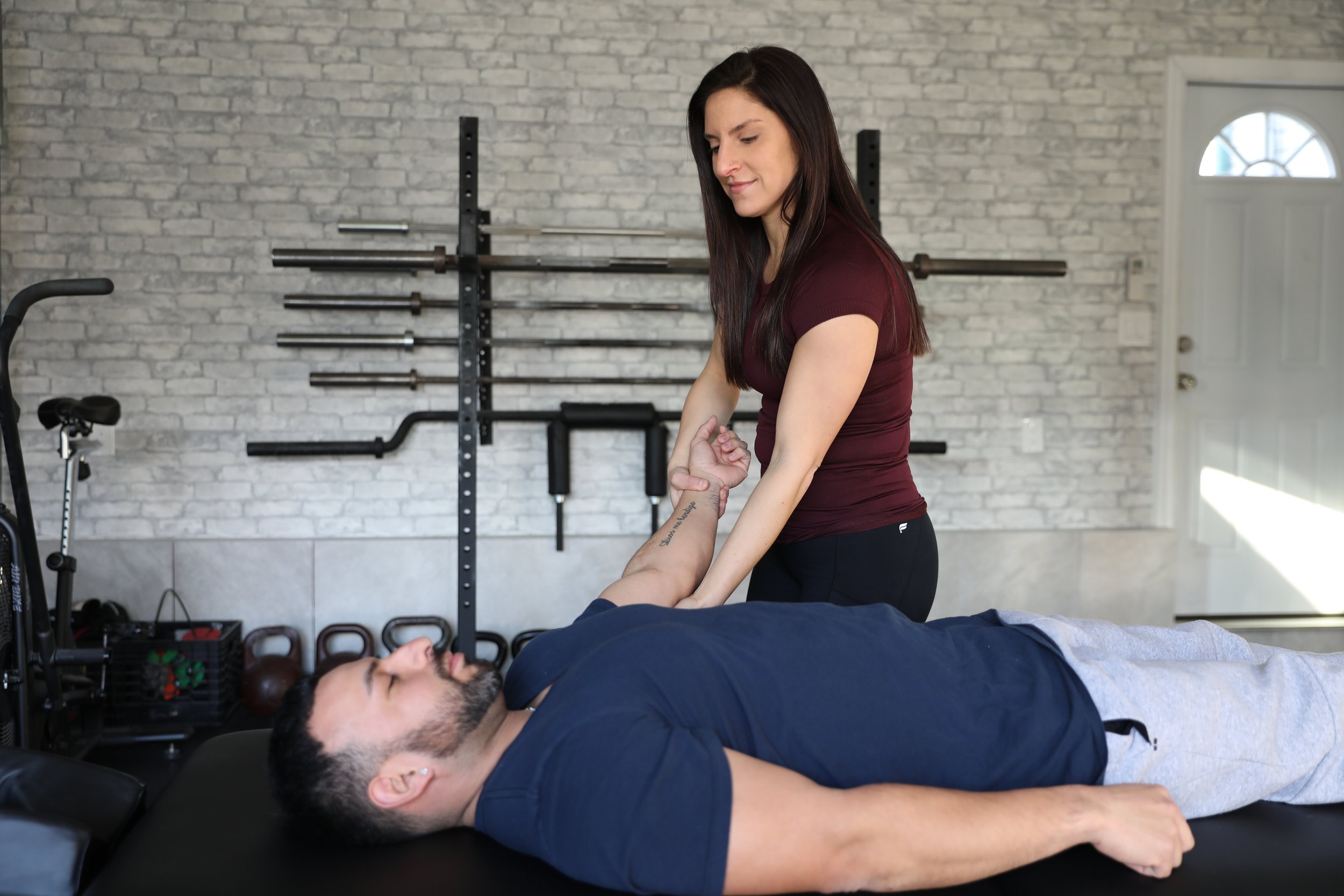I considered going to physical therapy school right after completing my undergraduate degree in exercise science, but I didn't. I wasn't sold on the idea of being a physical therapist because I wasn't impressed with what I saw within the field. It's funny because I hadn't even formed the bulk of my opinions about physical therapy at this point. Either way, I'm SO glad that I went with my gut and didn't pursue a physical therapy degree at the time. To be completely honest, I don't think I would've been invested enough, and I certainly wasn't passionate enough to successfully make it through a physical therapy doctoral program back then.
When I decided to go to school for physical therapy, I knew that I was going into a field that I wasn't impressed with. I loved the idea of combining the knowledge and skills that I'd gain in physical therapy school with my barbell training and powerlifting experience. Still, I didn't like how physical therapy was done in the traditional setting. There have been so many people (friends, family, and peers) that couldn't understand why I'd spend the time, money, and energy to complete a doctoral program when I had zero intentions of doing what everybody else does once they graduate. There have been so many times throughout this process that I wondered if what I was doing made sense. I mean, how many people want to go into a profession when they disagree with how most of that profession operates? Not many, but the people that do are usually the ones that want to create change.
So, what changed? How did I go from being confused about what I wanted to do and disinterested in the physical therapy profession to motivated to pursue a career in a field where I knew I'd have to be different to be happy?
Everything that I did leading up to my decision to apply to physical therapy school shaped the goals for my career and who I am today.
I started working as a personal trainer, and, to be honest, I wasn't crazy about it at first, similar to my apprehension about physical therapy. I enjoyed working out, and I had a degree in exercise science, so it made sense but, I knew I wasn't in the right place. I always thought that I'd suddenly know what I was doing with my life once I finished college. But the joke was on me because that couldn't be further from the truth. In my experience, everything just becomes more confusing once you graduate and have to make the "what am I going to do now?" decisions. Despite my confusion and uncertainty, I continued working as a personal trainer and felt like I was waiting to figure out what I was actually supposed to be doing.
Barbells helped me figure out what I was doing with my life. Yup, a piece of steel completely changed who I was, what I could do for other people, and what I'd do in the future.
I dabbled in Olympic weightlifting before falling in love with powerlifting. Powerlifting taught me about myself and my movement and showed me firsthand the benefits of resistance training and progressive overload. Regular strength training myself completely changed what I could do and wanted to do for my clients. It also led me to eventually start coaching powerlifters in addition to my training clients. All of my clients lifted weights and trained with barbells, regardless of their ability level.
Through working with various clients, I started to see that performing basic barbell movements and following the principles of progressive overload could actually help reduce my clients' symptoms. Whether clients had symptoms from an old injury, new symptoms that arose, or were recovering from surgery, they could progress through progressive overload at an elementary level. They could all perform the main lifts or variations adjusted to meet their ability levels and needs. It was clear that barbells, progressive overload, and compound movements were necessary parts of the rehab process.
There was just one problem: not all physical therapists agreed with this concept. On a couple of occasions, I had clients tell me that their physical therapist said they shouldn't be lifting heavy and training specific muscle groups or body parts and that doing so would be detrimental for them. Of course, I would educate my clients, but I was careful not to overstep my boundaries as a personal trainer. I simply disagreed with their advice, and, if anything, it was doing them a disservice.
And what about the powerlifters? What if a powerlifter needs physical therapy? Will they go to a physical therapist who tells them powerlifting is dangerous and shouldn't do it? And how will they rehab them in such a way that actually resolves the problem if they aren't familiar with the barbell lifts? I noticed that there was a gap between physical therapy and returning to higher levels of activity. There was so much emphasis on reducing pain levels that physical therapy centered on passive treatments, simple exercises, and instructions to rest and not do anything that causes pain. But this wouldn't fix the problem long-term, and I noticed cycles of recurring pain and symptoms when physical therapy treatment failed to specifically address the painful movements or activities. If someone's symptoms improve but return every time they resume lifting or get back up to a certain weight on the painful lifts, then the treatment doesn't work.
Here are the 3 main reasons I became a physical therapist:
To incorporate basic barbell movements and progressive overload into the rehab process to promote long-term change and improvements.
To properly educate clients about the benefits of full-body strength training and how it can be safely incorporated into their barbell training programs.
To combine my background in powerlifting and barbell training with a physical therapy degree to successfully rehab barbell athletes in a way that is relevant to their goals and sport.
After about 6 years of working as a personal trainer, I finally had a good reason to apply to physical therapy school. I gained experience that would shape what I did with my degree once I graduated. I saw a problem, and I wanted to see things done differently. So yes, I intentionally went to school for physical therapy, knowing good and well that I had zero intentions of fitting the mold once I graduated. My experience in physical therapy school only reinforced the views and opinions that I already had.
Once I started PT school, I quickly realized why treatment in the typical outpatient setting was the way it was. In PT school, they prepare you to take and pass your boards. There was never any talk about basic barbell movements or progressive overload and how to apply it to anyone starting at even the lowest level. Without having knowledge and experience related to strength training, so many people were limited to what they learned in PT school. When I started my clinical rotations, I really began to see how insurance dictated treatment and the amount of time a PT could spend with a single patient. How could I really spend valuable time with a patient or client, teaching them how to move better against resistance when working with two patients at once and a clinic wanted me to bill for more than just therapeutic exercise? I couldn't, and my clinical rotations were a great reminder of what I didn't want to do when I graduated.
I didn't want to give everyone theraband table exercises, work in a clinic that didn't have anything heavier than a 10lb dumbbell, or do passive treatments that I didn't agree with or feel that a patient needed (among other things). I also didn't want to let insurance companies dictate the treatment I provided when I didn't feel like it was in the patient's best interest. I also didn't want to spend my professional career walking a fine line to provide patients with a level of care that I consider adequate and insurance companies feel is justified.
What else can you do with your physical therapy degree if you don't want to do what everyone else is doing?
There's a lot that you can do! But here are the two most important things you can implement right now to become a better physical therapist.
Begin continuing education immediately after you graduate, even if you don’t need CEUs right away. Even if PT school doesn't prepare you to integrate the barbell lifts and principles of progressive overload into rehab, that doesn't mean that you can't do it. I've been asked if my school provided me with a different education that focused more on the kind of work I do today. Simply put: no, it didn't, but that doesn't mean you shouldn't pursue a career in physical therapy. There are many resources, including practitioners like us, at Progressive Rehab & Strength, that can help you learn how to do something unique with your PT degree. Seek out continuing education that helps you learn principles and practical application of strength and resistance training across the lifespan.
Be different and break the mill-model mold. I've also had so many people tell me that they don't want to go into physical therapy because they're not impressed with the level of care provided in PT clinics. You don't have to fit the mold! In fact, you shouldn't if you don't want to. Not to be too philosophical, but… be the change you wish to see in the world. If you're passionate about physical therapy but don't agree with how it's predominantly being applied, change it.
Your education doesn't stop after PT school, and no one said that you have to do what everyone else is doing. We completely understand that it's challenging and confusing to navigate becoming the type of physical therapist or clinical coach you want to be, but it is possible. There's so much you can do with your doctorate in physical therapy. We're here to help because we want to see more people changing the face of physical therapy to move towards a more progressive model and provide more effective treatment.
If you're a physical therapist who is wondering how to take your career to a more meaningful level and incorporate the principles of barbell training and progressive overload into your practice, check out our FREE Beginner Barbell Strength Program. These free downloads cover the foundational knowledge of strength training and how to adjust and incorporate the barbell lifts to clients of all levels, and the type of equipment you should have in your practice. We're here to help you find your place within a profession that has so much room to change and will give you room to grow.
Have questions about clinical practice? Join our free Facebook group, where clinical coaches find support, get questions answered, and advance the field together!



